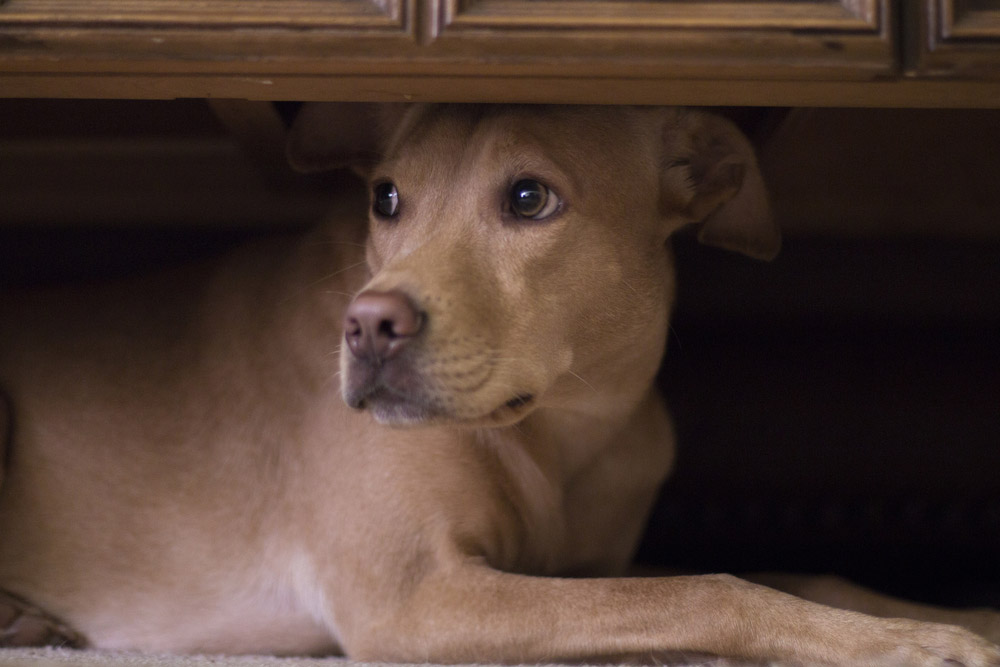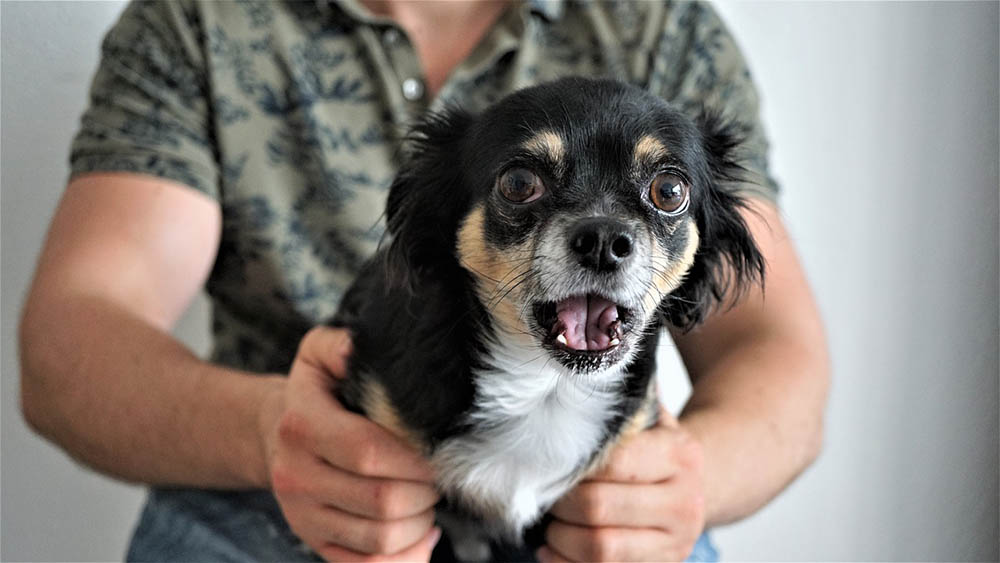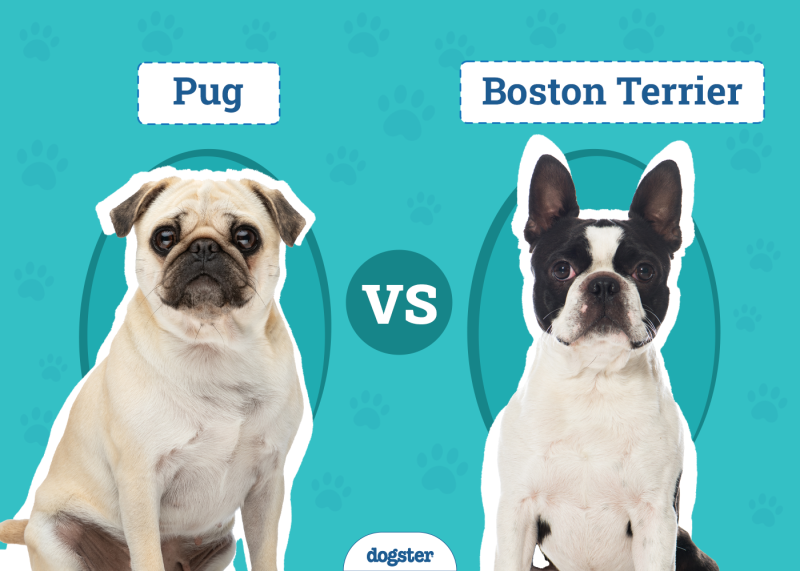In this article
View 2 More +When we describe a dog as being agitated, we are observing a pup appearing anxious or upset about something. Canines can feel distress, fear, anger, or frustration for physical or mental reasons, which may require veterinary intervention. Observing the surrounding circumstances is essential for identifying the problem and finding a solution for your pooch.
You know your pet the best. You notice when something is wrong or abnormal for your pup, and that’s an advantage because it can help you nip a problem in the bud. The first step in figuring out why your dog is agitated is to identify the signs and then take them to the vet for a check-up to try to figure out the cause.

The Signs of Agitation in Dogs
Agitation describes several behaviors and, because of the various causes, it’s not diagnostic of itself. The glaring factor is that it’s out of character for your pet. The animal isn’t content or relaxed in the present situation, leading to spikes in stress. Signs of this issue include the following:
- Growling
- Avoidance
- Cowering
- Hiding
- Panting
- Whining
- Barking
- Nippiness
- Pacing
- Fearful or aggressive body language
Behavior in dogs is a complex topic. We understand if you feel helpless, and it would be so much easier if your pup could tell you what’s wrong. A vet will likely ask you several questions about your dog’s behavior if it gets to that point, but you can speed up a diagnosis by noting any red flags and sharing all of this information with the vet. If your dog is agitated, though, there are a few potential causes you should consider.


The 5 Common Causes of Agitation in Dogs
1. Pain or Illness
Dogs often become agitated if they are in pain. That can have myriad causes, from an injury to gastrointestinal obstruction to a torn nail. Accidental poisoning and food intolerances can also make your pup uncomfortable. Your pet may behave aggressively or isolate themselves because they are unwell, and want to be left alone. These conditions often occur suddenly, or they can build over time. Your dog will likely show other signs of illness such as inappetence, vomiting, diarrhea, limping, lethargy, or skin irritation. If your dog shows any of these signs, they need veterinary help.
2. Noise Sensitivity
Many dogs are noise-sensitive, making sounds like thunder or fireworks especially distressing. A Finnish study found that 32% of canines fit this profile.1 Loud noises can upset your pup in part because they may not understand it and, thus, fear it. Dogs hear at a higher frequency than humans as well, so booming sounds might even be painful for your pup.
Even everyday household items may produce a lot of noise. For example, a food processor tops 95 dB. Landscaping or building equipment can be even louder and can add to your dog’s anxiety. It’s worth noting other behavioral issues often accompany noise sensitivity, such as separation anxiety. The latter causes agitation when a pup is left alone.

3. Fearfulness
Fearfulness can stir up many negative emotions in your pet, in addition to agitation. Research has shown it has a genetic link.2 Fearfulness is more likely if a dog is separated from their mother and littermates too early.3 Dogs without adequate exercise or socialization are also prone to fearfulness. New experiences or exposure to certain triggers can frighten these animals, causing them to act agitated and sometimes aggressively.
4. Aggression
If your dog’s body language seems more assertive, rather than fearful they may be agitated due to aggression. There are several types of aggression in dogs including territorial aggression, which will occur mainly at home and when there are people or animals present that your dog perceives as a threat. Your dog’s aggression can also be redirected onto family members and pets, if they can’t reach the source of the aggression.

5. Unmet Needs
Your dog has innate needs. The more obvious physical needs are food, water, and shelter. Your dog also has a need for mental stimulation, companionship, and exercise. Different breeds have different needs according to what they were bred for, for example working breeds need more physical and mental exercise, whereas companion or “toy” breeds have a greater need for companionship. Different breeds also have different grooming needs to remain comfortable. If your dog is hungry, thirsty, bored, or uncomfortable they will show their discontent by becoming agitated. This can include destructive behavior, excessive barking, and pacing.

When to Call the Vet
Pay attention to the triggers of your dog’s agitation, noting when it occurs and if it’s an ongoing issue or a one-off event. Of course, pain and illness are valid reasons to get your pup to the vet, but so are ongoing behavioral issues. Prompt action is necessary, particularly if you notice other signs that include the following:
- Loss of appetite
- Vomiting
- GI distress
- Drooling
- Weakness
- Obvious distress
- Pain
- Lethargy
- Agitation that does not resolve or is recurring
The vet will get a complete history of your pet’s behavior and do a full workup to rule out various causes. They may also order X-rays, bloodwork, or other diagnostic tests as needed. It could be something minor and easily treated. However, depending on the other signs your dog presents, it can also point to serious medical issues.
The vet may refer you to an animal behaviorist if there isn’t a physical cause of your dog’s agitation. They will evaluate your pet and develop a suitable treatment plan. Your participation and adherence to these instructions is imperative. Some behavioral problems may take time to correct. For example, some issues like obsessive-compulsive disorder (OCD) can be controlled but not cured.
Sometimes, mental stimulation and enrichment can help an agitated dog. A walk in the neighborhood or playtime at a dog park can provide a welcome distraction. Seeking veterinary guidance is critical for ensuring a good quality of life for your dog and relieving the source of their distress. We strongly urge you to act promptly for the animal’s mental and physical well-being.
If you need to speak with a vet but can't get to one, head over to PangoVet. It's our online service where you can talk to a vet online and get the advice you need for your pet — all at an affordable price!


Final Thoughts
Agitation in dogs isn’t diagnostic on its own. Instead, it often accompanies other signs that something isn’t right in your dog’s world. Determining the cause and finding a treatment is essential and part of responsible pet ownership. Remember that the situation will likely deteriorate without action, leading to unnecessary complications. So, get your dog to the vet as soon as possible if they’re acting out of the norm.
Featured Image Credit: Mylene2401, Pixabay



















